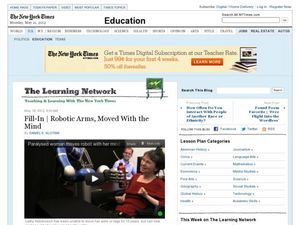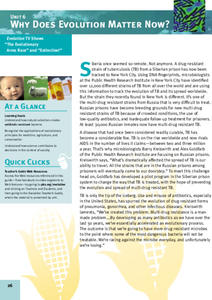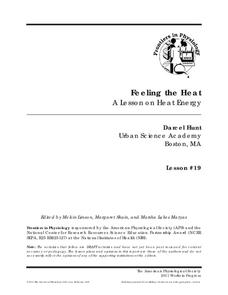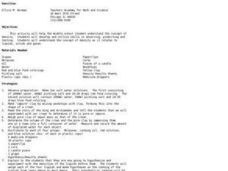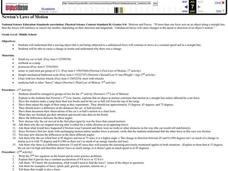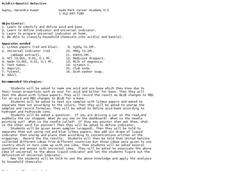Curated OER
Then and Now: Public Health from 1900 to Today
Throughout the 20th Century, the world has become a healthier place. By examining the public-health issues and diseases doctors faced during the 1900's, students will compare and contrast life from today vs. life in the 1900's. Their...
Curated OER
Medicine: Then and Now
Young scholars read ancient Greek texts to explore ancient healing practices and compare them to modern-day medicine. They conduct research into modern first-aid practices, using a standard medical reference.
Curated OER
Does Mother Nature Know Best?
Investigate herbal medicine in the science or health classroom with this lesson from the New York Times. After a discussion about class members beliefs about and experiences with herbal medicines, pupils read an article that might impact...
Curated OER
Brain-Controlled Robotic Arms: Cloze activity with Article
Fascinating content about current medical research on brain-controlled prosthetics comes in cloze activity form with a link to the original article. Useful for listening and reading comprehension skills development, and for any science...
National Library of Medicine
Your Environment, Your Health: Air Quality
Some scientists argue that air pollution now causes more deaths than smoking. The second unit in a six-part series focuses on air quality. Scholars learn what's in the air, how clean the air around their school is, and what they can do...
Curated OER
Medicine: Then and Now
Students read ancient Greek texts to explore ancient healing practices and compare them to those of modern times. They explain Greek healing practices for wounds.
Curated OER
Why Does Evolution Matter Now?
Students examine how natural selection creates antibiotic-resistant bacteria,
recognize applications of evolutionary principles for medicine, agriculture, and conservation, and discuss how science contributes to decisions in context of...
American Physiological Society
Sit On It
How do product designers come up with the variety of things we see in stores and on TV every day? They identify a need, then create something that meets that need. Sounds simple, right? A two-week instructional activity puts seventh...
American Physiological Society
Feeling the Heat
How do the changing seasons affect the homes where we live? This question is at the forefront of engineering and design projects. Challenge your physical science class to step into the role of an architect to build a model home capable...
Curated OER
Benefits, drawbacks of alternative healing
Students discuss alternative healing techniques, then chart the potential benefits and drawbacks of alternative health therapies. They design symbols representing alternative healing techniques.
Curated OER
Substance Use, or Abuse?
Students identify the medicinal benefits, and ill effects, of a variety of controlled substances. They determine whether or not they think hallucinogens should be researched for possible medicinal purposes.
Curated OER
Densities
Students explore the concept of density. For this density lesson plan, students determine the density of a crown and a sample of clay. They hypothesize about the densities of 4 liquids they are given including molasses, cooking oil, a...
PBS
Stories of Painkiller Addiction: Prescription Drug Abuse Awareness Campaign
The I-STOP law was designed to regulate the distribution and tracking of prescription drugs. After reading an article about its signing and implementation, middle and high schoolers work together to come up with their own ideas for an...
Curated OER
Newton's Laws of Motion
Students perform three activities that each demonstrate one of Newton's Laws of Motion. They use a ramp and toy car to demonstrate inertia, calculate acceleration due to gravity, then use a medicine ball and rolling chair to demonstrate...
Curated OER
From Granite to Paper
In this weathering worksheet, students read about physical and chemical weathering and how kaolin in used in paper. Then students complete 4 short answer questions.
PBS
Stories of Painkiller Addiction: The Cycle of Addiction
Drug addiction, including prescription drug addiction, begins with a reason that's different for every user. High schoolers learn more about the reasons people begin abusing drugs with a set of videos and worksheets that discuss four...
American Museum of Natural History
What's This? Leeches
Who actually likes leeches? Meet a scientist that makes his living letting leeches feed on him. Pupils learn about the characteristics of leeches and different variations of the species. The lesson works as a remote learning resource or...
Curated OER
Acid(s)-Base(s) Detective
Students investigate acids, bases, indicators and universal indicators. In this acid and base lesson plan, students test 6 samples with litmus paper and determine if they are acids or bases. They separate out 7 samples using litmus paper...
Curated OER
Some Puzzling Thoughts about Space Radiation
In this space radiation worksheet, students solve 22 algebraic expressions for "x". They use their answers which correlate with a word in a word bank. They use these words to fill in the blanks of sentences about the effects of space...
Curated OER
What is Everything Made of?
Learners observe a demonstration on how we see space between water molecules. In this experimental lesson students discover what elements make up the things around them and discuss what they learned.
Curated OER
How Do You Know There is Air in a Bag?
Fourth graders explore air as a material substance. Through experimentation and discussion, they explore how air can be classified as a material substance. Students write three examples proving that air is a material substance in their...





